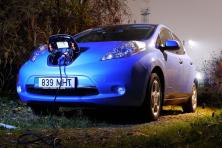The odds that the proposed Millennium coal-terminal project in Longview, WA will ever happen are plummeting right alongside Arch Coal’s fortunes.
Arch, which co-owns the project with marginally capitalized partner Lighthouse Resource (which used to be called Ambre Energy North America), is in a “death spiral,” fighting for survival alongside every other U.S. coal producer as demand for its product tanks and oversupply persists.
The company’s game plan was to get Millennium built and then use it as a lifeline to Asian markets, a far-fetched enough proposition already and an ever more hollow idea as time goes by. The company has neither the money nor the credit to proceed. Its market capitalization stands today at about $35 million, a tiny fraction of where it was just a year or two ago, and Ambre is worth even less.
An analysis we published in late July (with Greenpeace, the Sierra Club, Earthjustice and the Dogwood Initiative) documents how Arch’s hopes for Millennium continue to crumble as the company’s financial footing erodes.
A couple of passages:
- “Arch Coal has more than $5.1 billion in long-term debt, compared to a market cap of $47 million (as of July 20, 2015). Arch Coal’s current debt incurred at rates ranging from 7–9.9%. Arch Coal recently announced the extension of a tender offer to swap some of its debt at rates ranging from 6.25%, 8%, and 12%. By contrast, current average rates for all corporate bonds is 3.39%, for corporate AA bonds 2.5%, and for corporate high yield (“junk”) bonds 6.7%. These high rates will make financing of any new project more challenging and more expensive.
- Millennium would have a purported price tag $643 million, which is probably exceptionally conservative. The number, which was first tossed out four years ago, doesn’t include taxes, inflation, or—as our report said—“the potential for hundreds of millions of dollars in additional mitigation costs that may be required based on the results of environmental review and permitting.”
ARCH, IN FACT, IS IN THE MIDST OF AN EXISTENTIAL CRISIS WITH INVESTORS AND LENDERS and doesn’t have anything close to what it would take to pull the project off, nor does it have the credit rating to borrow for it. And while Arch’s problems in many ways have been brought on by poor management, the coal industry as a whole is in such poor shape that no buyer of Arch or its leavings could make a go of Millennium either.
In summary, as we said in our recent report, “it is very hard to imagine any circumstances in which the Millennium Bulk Terminal gets financing from private sources, without a dramatic reversal in market conditions.”
This is not to say that Arch—or for that matter any coal company—will not look to subsidies as a way out of the industry’s mess. Coal-export promoters have been promising for years that the private sector is ready and willing to invest hundreds of millions of dollars to develop port facilities and related infrastructure. They’ve seemed more interested, generally, in finding ways to make taxpayers foot the bill, however, which seems the only way the Millennium project will ever be built.
This article was originally published by the Institute of Energy Economics and Financial Analysis.





